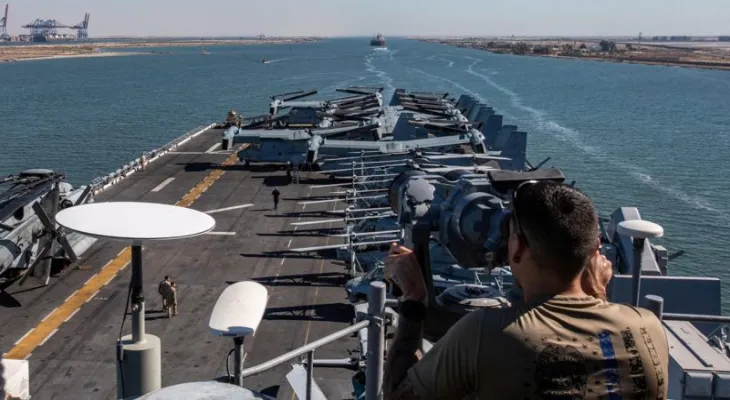Search here
Newspaper
Search here

Arab Canada News
News

Published: August 8, 2023
Books - Mohamed Nassar
More than 3,000 American soldiers arrived in the Red Sea aboard two warships, a significant reaction from Washington following Iran's detention of two tankers, the U.S. Navy announced on Monday.
The arrival of these soldiers adds to the increasing American military posture in the tense and vital Gulf waterways for global oil trade, prompting Tehran on Monday to accuse the United States of stirring instability in the region.
The U.S. military says Iran has either detained or attempted to seize nearly 20 vessels flying an international flag in the region over the past two years.
The U.S. Fifth Fleet stated in a statement that American sailors and Marines entered the Red Sea on Sunday after passing through the Suez Canal in a move that was previously announced.
The statement added that the soldiers arrived aboard the two warships: USS Bataan and USS Carter Hall, providing "greater flexibility and maritime capability" to the Fifth Fleet.
Agence France-Presse quoted Fifth Fleet spokesman Tim Hawkins as saying that this troop deployment adds to efforts to "deter destabilizing activity and ease regional tensions caused by Iran's harassment and seizure of commercial vessels."
USS Bataan is described as an amphibious assault ship capable of carrying fixed-wing aircraft and a helicopter, in addition to landing equipment.
As for the USS Carter Hall, it is a landing ship designed to transport Marines and their equipment and to deliver them to shore.
Iranian Foreign Ministry spokesman Nasser Kanani said at a news conference on Monday that the deployment of U.S. forces serves only Washington's interests.
He added, "The U.S. government's military presence in the region has never created security. Their interests in the region always compel them to fuel instability and insecurity."
He stated, "We are firmly convinced that the Gulf Arab states are capable of ensuring their own security."
The recent troop transfer comes after Washington said its forces prevented two Iranian attempts to seize commercial tankers in international waters off the coast of Oman on July 5.
Iran's maritime services reported that one of the tankers, the Richmond Voyager, flying the Bahamas flag, collided with an Iranian vessel, and the collision resulted in serious injuries to five crew members, according to the official Iranian news agency.
Iran had detained two oil tankers during a week in the territorial waters in April and early May.
Those incidents followed accusations from Israel and the United States in November that Iran carried out a drone attack on an oil tanker owned by an Israeli company carrying gas oil off the coast of Oman.
Last month, the United States announced it would transfer an F-35 and F-16 destroyer, along with an amphibious readiness group/maritime reconnaissance unit, to the Middle East to deter Iran from seizing vessels in the Gulf.
The rising military response from Washington comes at a time when engagement between the region and China is deepening, with China mediating a rapprochement between the Gulf rivals Saudi Arabia and Iran that surprised everyone in March.
Relations between Tehran and other Gulf states are also on the rise. Both the President of the UAE and the Foreign Minister of Kuwait received invitations to visit the Islamic Republic last week.
Torbjorn Soltvedt, who works at Verisk Maplecroft Risk Intelligence, stated, "Security will remain a friction point in U.S.-Gulf relations even if the threat posed by Iranian attacks on shipping diminishes in the short term."
He was quoted by Agence France-Presse as saying that "the perception among some that the U.S. does not do enough to deter Iranian attacks on international shipping will persist."
He added, "There is a clear need for a new approach."
Comments